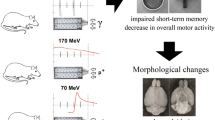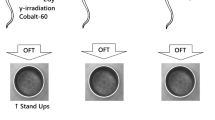Abstract
The early delayed effects of accelerated carbon ions and protons on the cognitive functions of mice using tests of the total activity, spatial learning, and long-term and short-term hippocampal-dependent memory were studied. The obtained results showed that irradiated animals do not develop an altered behavioral pattern: the level of anxiety is not increased, the exploratory model of behavior is clearly pronounced, and there is no deficiency of hippocampal-dependent memory. However, the long-term memory test revealed fewer errors in finding an escape box in a group of animals irradiated with protons compared to the control animals and mice irradiated with carbon ions. The results may indicate a better preservation of memory traces under these conditions.





Similar content being viewed by others
REFERENCES
Bramlett, H.M. and Dietrich, W.D., Long-term consequences of traumatic brain injury: current status of potential mechanisms of injury and neurological outcomes, J. Neurotrauma, 2015, vol. 32, pp. 1834–1848.
Sheline, G.E., Radiation therapy of brain tumors, Cancer, 1977, vol. 39, suppl. 2, pp. 873–881.
Yan, L., Xi, Z., and Drettner, B., Epidemiological studies of nasopharyngeal cancer in the Guangzhou area, China. Preliminary report, Acta Otolaryngol., 1989, vol. 107, nos. 5–6, pp. 424–427.
Brown, W.R., Blair, R.M., Moody, D.M., et al., Capillary loss precedes the cognitive impairment induced by fractionated whole-brain irradiation: a potential rat model of vascular dementia, J. Neurol. Sci., 2007, vol. 257, nos. 1–2, pp. 67–71.
Khmelevskii, E.V., Radiation therapy for prostate cancer: photons, protons, or heavy ions, Radiats. Onkol. Yad. Med., 2013, no. 1, pp. 28–33.
Cheung, K.Y., Intensity modulated radiotherapy: advantages, limitations and future developments, Biomed. Imaging Interv. J., 2006, vol. 2, no. 1, p. e19.
Kiffer, F., Boerma, M., and Allen, A., Behavioral effects of space radiation: a comprehensive review of animal studies, Life Sci. Space Res., 2019, vol. 21, pp. 1–21.
Whimbey, A.E. and Denenberg, V.H., Two independent behavioral dimensions in open-field performance, J. Comp. Physiol. Psychol., 1967, vol. 63, no. 3, pp. 500–504.
Rola, R., Raber, J., Rizk, A., et al., Radiation-induced impairment of hippocampal neurogenesis is associated with cognitive deficits in young mice, Exp. Neurol., 2004, vol. 188, pp. 316–330.
Ushakov, I.B., Shtemberg, A.S., and Shafirkin, A.V., Reaktivnost’ i rezistentnost’ organizma mlekopitayuschikh. Printsipy formirovaniya, regulyatsii i prognozirovaniya (The Reactivity and Resistance of the Mammalian Organism. The Principles of Formation, Regulation, and Forecasting), Moscow: Nauka, 2007.
Rabin, B.M., Shukitt-Hale, B., Carrihill-Knoll, K.L., and Gomes, S.M., Comparison of the effects of partial- or whole-body exposures to 16O particles on cognitive performance in rats, Radiat. Res., 2014, vol. 3, no. 181, pp. 251–257.
Shtemberg, A.S., Bazyan, A.S., Lebedeva-Georgievskaya, K.D., et al., Effect of high-energy proton irradiation on the behavior of rats and its neurochemical mechanisms, Aviakosm. Ekol. Med., 2013, vol. 47, no. 6, pp. 54–60.
Belyaeva, A.G., Shtemberg, A.S., Nosovskii, A.M., et al., Effect of high-energy protons and 12C carbon ions on cognitive functions of monkeys and the content of monoamines and their metabolites in peripheral blood, Neurochem. J., 2017, vol. 34, no. 1, pp. 1–9.
Shtemberg, A.S., Kokhan, V.S., Kudrin, V.S., et al., The effect of high-energy protons in the Bragg peak on the behavior of rats and the exchange of monoamines in some brain structures, Neurochem. J., 2015, vol. 32, no. 1, pp. 78–85.
Belokopytova, K.V., Belov, O.V., Kudrin, V.S., et al., Dynamics of metabolism of monoamines in the structures of the rat brain at a later time after irradiation with accelerated carbon ions, Neurochem. J., 2016, vol. 33, no. 2, pp. 147–155.
Balakin, V.E., Shemyakov, A.E., Zaichkina, S.I., et al., Long-term radiation effects after hypofractionated irradiation with protons of solid Ehrlich carcinoma in mice, Biophysics (Moscow), 2017, vol. 62, no. 1, pp. 138–142.
Robbins, M.E., Payne, V., Tommasi, E., et al., The AT1 receptor antagonist, L-158,809, prevents or ameliorates fractionated whole-brain irradiation-induced cognitive impairment, Int. J. Radiat. Oncol. Biol. Phys., 2009, vol. 73, pp. 499–505.
Author information
Authors and Affiliations
Corresponding author
Ethics declarations
Conflict of interest. The authors declare that they have no conflict of interest.
Statement on the welfare of animals. The study was approved by the Biosafety and Bioethics Commission of the ITEB RAS (protocol no. 23). The experiments were carried out in accordance with the requirements of the Federation of European Scientific Associations for the maintenance and use of laboratory animals in scientific research (FELASA).
Rights and permissions
About this article
Cite this article
Sorokina, S.S., Zaichkina, S.I., Rozanova, O.M. et al. The Early Delayed Effect of Accelerated Carbon Ions and Protons on the Cognitive Functions of Mice. Biol Bull Russ Acad Sci 47, 1651–1658 (2020). https://doi.org/10.1134/S1062359020120109
Received:
Revised:
Accepted:
Published:
Issue Date:
DOI: https://doi.org/10.1134/S1062359020120109




